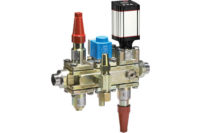The conference was the 32nd Open Ended Working Group of the Parties to the Montreal Protocol. It was one in a series of international events looking at ways to deal with environmental concerns.
As part of the event, Midwest Refrigerants made a presentation titled “Destruction by Incineration No Longer the Only Solution.” It described Midwest’s developments in eliminating end-of-life, unwanted refrigerants worldwide. In attendance were representatives from governments, environmental organizations, and fluorocarbon manufacturers.
The report began, “Midwest Refrigerants has created a new, breakthrough technology that does not incinerate unwanted ozone depleting substances and greenhouse gases [ODS/GHG]; it converts them back into their original, source chemicals, dramatically lowering the cost of ODS/GHG destruction.”
It was noted that in November 2011, at the meeting of the Montreal Protocol members in Bali, Indonesia, the Midwest Refrigerants Chemical Conversion Process received “full approval as an accepted destruction technology for ozone depleting and greenhouse gas substances.” It also noted that the technology is “one of the first approved by UNEP-TEAP (United Nations Environment Programme-Technology & Economic Assessment Panel) that does not use combustion or incineration to achieve ODS/GHG destruction and create value.”
The technology is described as “chemical reaction with hydrogen and carbon dioxide” and manipulates the unwanted ODS/GHG molecules and irreversibly converts them back into their original source chemicals, 99.99+ percent anhydrous hydrogen fluoride, hydrogen chloride, and carbon dioxide, all for new uses such as hybrid car batteries and electronics.”
In the process, “Even virtually undetectable emissions are not atmospherically vented, as the Midwest system is a closed loop. There are no emissions, no waste streams, and the process is extremely energy efficient. “The process is effective on CFCs, HCFCs, HFCs, PFCs, and HFOs. The process is also effective on halons, methyl bromide, and most POPS-Persistent Organic Pollutants.”
The report goes on to contend that the U.S. State Department creation of the Climate and Clean Air Coalition focusing on the elimination of short-lived climate pollutants, including hydrofluorocarbons (HFCs), followed by the G8 nations joining the coalition, “is confirmation that the time for this technology has arrived.”
It was further noted that the Midwest technology will also be used in refrigerant manufacturing plants because that process “results in streams of fluorocarbon waste. These are normally eliminated within the manufacturing facility by thermal oxidizer; another version of destruction by incineration. The Midwest process takes these waste streams and converts them back into their source chemicals, all for reuse.”
Lew Steinberg, Midwest president, said the company will be listed on the U.S. Environmental Protection Agency web page as an approved chemical conversion facility once the first U.S. facility is in operation. Steinberg also said that “since chemical conversion is considered part of the chemical manufacturing process, not destruction by combustion, and is environmentally more favorable, used ODSs are not subject to hazardous waste rules.”
Steinberg said the first Midwest conversion plant in the United States will be operational in early 2013 and will be able to convert 2 million pounds (2.5MT) annually. And, he said, engineering has been completed for plants that can process up to 12-15 million pounds (5,500 to 7,500 MT) annually.
Publication date: 12/17/2012









